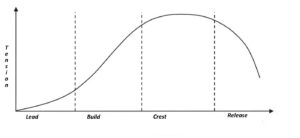Your story matters.
Just guessing here: your personal story has progressed beyond the “once upon a time” and is closer to the “happily ever after,” right? And don’t we all want that “happily ever after” sooner rather than later, thank you very much? That’s the true power of a great story with feeling and the glue that matters in relationship.
Somewhere in your story, things got confusing, sketchy, and weird. maybe even dangerous. Relationships got threatened. Worry set in. Then stagnation.
That’s what a good story does, provided it also has a heroic figure we can believe in, whose dreams we share, and whose feelings we feel. That gnarly tension is the fuel that powers the hero or heroine – that’s you, by the way – to want to keep on keepin’ on.
Whatever your superpower, you must use it to get to the happily ever after. The unknown aspects of your story – the ones you can only discover by living “along some distant day into the answer,” as poet-guide Rilke wrote it – are the obstacles in your way. Without them? No story.
Obstacles
Some of those obstacles are real, and some are manufactured by people who want to tell your story for you or tell you how you ought to tell your story or throw sucker punches at ignorance. That’s not bait you need to take.
The manufactured stories that aren’t yours can appear as self-help how-to for business, parenting, lifestyle, or whatever, written or recorded by credential collectors with lots of advice and lots of best-selling social credibility powering their own success. However popular, their advice isn’t the same thing as your real, learned-the-hard-way wisdom, especially if your story isn’t the same as theirs. And you only accumulate that wisdom the hard way, not in a content-consumption marathon.
Again: you only accumulate wisdom the hard way. Content can’t replace wisdom, help you avoid your authentic obstacles (you need those obstacles!), or do anything for you that you won’t do yourself.

Photo courtesy Darius Bashar on Unsplash.com: https://unsplash.com/@dariusbashar
However tried and true it may be for any influencer and for their acolytes, the best advice is still just advice. A detour into someone else’s “happily ever after” takes you away from your own real life – your own story. Influencers bank on hopes that their shiny helpful advice and your fear of missing out will seem less scary than the monsters on your own path.
But they’re wrong. That’s abusing the power of fear, and you’re the scared commodity.
The fastest, most effective way to “happily ever after” is to confront your personal scary monsters, your biggest fears – to take your hardest quest. Instead of consuming more content about swimming, jump in the pool already and just do it.
That last paragraph will shave costly years off your story. You’re welcome.
The truth is – and this is what influencers hope you don’t realize because it will end their influence over you – that the best stories aren’t about reason. The best stories are about emotion, and no one except you is in charge of how you feel. A punch you watch or read about is not the same as a punch that lands on you.
Feeling
No one else can tell you what to feel, when to feel it, or how to use emotion as a superpower until you figure it out for yourself, heuristically, self-evidently, by doing stuff that hurts, scares the bejeezus out of you, makes you so angry that you want to explode, or throws you over the precipice of anger, fear, or grief.
No amount of facing your fears, managing your anger, or counseling your grief compares to the real-life quest of fully embodying your emotions to discover why and how they power your story.
It’s because of the way emotions play in our stories, and how that is unique to every one of us, that we get to have personal fantastic stories no one else can predict or replicate. No shaman or guide – even in the movies – actually knows with certainty how anyone’s story will evolve or end. The story’s Guide is only there to suggest that the hero or heroine might wish to support their story in a particular way – a way that connects the power of emotion with meaning and purpose.
That is, your Guide can offer you wisdom but not how-to. They teach skills, yes, and you’d better practice diligently, but how you use those skills? That’s all up to you.
All the reductionist goal-setting, disciplined entrepreneurship, and pitching of anything don’t matter when it comes to emotion: your emotion. Neuroscience can explain how and why things happen, but you can’t use the neuroscience of emotion unless you first master how things feel. How-to books can’t tell you how it feels to walk barefoot over a chasm on the razor edge of a sword.
Imagery and science inspire us, assure us that we already have the basic training and preparation we need, and beckon us to the real task that hasn’t been experienced by anyone ever until you now. Why wait?
Get that well, friend: the real task – the real relationship – is one that nobody except you has ever done before.
* * * * *
Fear, Anger, and Grief
“Feel the fear and do it anyway,” says the Guide, and who likes to feel fear? We misunderstand and ignore the fear, try to do it, and fail. Why? We didn’t feel the fear fully. We got fear all wrong, reasoned it was anxiety (negative), not excitement (power). Our reasoner wasn’t broken, but the choice to minimize the effect of fear (by stuffing it so that we can “do it anyway”) also minimized fear’s potential as fuel. Poor choice.
What about anger? We got angry, and we didn’t like it. We chose to experience anger negatively. All that fury, outrage, and scattered shock we could have used as awe-inspiring passionate, laser-focused power? Stuffed or minimized rather than wielded well. Poor choice.
Then, as we sank into the well of grief, we kept fighting for air rather than surrendering to the unity of sadness. Poor choice.
Are you getting this? There’s a reason (ha!) that the only thing we have to fear is fear itself, that rage is blind, and that toddlers are told “Don’t cry, Billy,” and it’s not to teach us to suppress or, worse, “manage” those emotions, even though that is, sadly and honestly, the effect.
If we truly understood the coincidence of reason and emotion, we would use our emotions skillfully instead of un-intelligently stuffing them up inside us. We wouldn’t default to cerebral pattern-matching when more powerful (and more reasonable) options exist.
So, once more…with feeling.
Here’s the Point

Photo courtesy Fran McKenna on Unsplah.com: https://unsplash.com/@frankiefoto
Tell your epic story. Better yet, see if you can convincingly re-tell your customers’ or clients’ or patients’ or friends’ stories after they tell them to you.
Yes, listening is a skill, but hearing and re-telling someone else’s story with the feelings they feel is a superpower. It’s a superpower in short supply in our world. Master it, and you’ll be closer to happily ever after than all the other rats in the race.
For example…
If your audience can’t sense that you feel what they feel, even a great script will fail. This is what sets professional storytellers apart from TEDx wanna-be’s. A truly great storyteller reads the room and knows how to build an emotional connection between audience and pitch.
Real empathy (or compassion, since “empathy” is now a fungible term) is being able to tell someone else’s story better than they do. And that only works if the storyteller can feel what the audience feels. So, get busy taking the lids off of your emotional pressure cookers, exploring what’s inside, and choosing how you’ll use what you find.
Emotions’ Near Neighbors

Photo courtesy Abi Ismail on Unsplash.com: https://unsplash.com/@abiismail
What you’ll find there will probably blow your umbrella inside out. It may spark one or more personal shadow journeys. Take them. There are great Guides out there whose purpose is your success. Find one. Learn the skills of how to stop thinking already and start feeling. As you get out of your head, begin to combine reason and emotion into your own personal superpower.
If fear feels like anxiety, choose the pivot to excitement, fear’s near neighbor.
The fury of anger can pivot to powerful focus.
Grief is a gateway to the feeling of powerful surrender (yes, there is great power in acceptance).
And joy? It pivots from the self-deceptive power of positivity to self-compassionate, self-aware, self-accepting bliss.
You’ll figure it out. I’m confident you will. And take confidence that your self-evident experience will be durable and that, while we all still have egos, you will be among the few brave leaders who have risen above the noise of content to the clarity of consciousness.
You see, only when you can tell someone else’s story better than they do and with the feelings they feel can you make a durable, sustainable relationship, whether personal, transactional, or transformational. If you try and fail, you’ll be ghosted. Feel that. Then re-visit your Guide. Hone your skills. Tell that story again.
Leaning Toward Your Happily Ever After
When you find mastery, you’ll have skills that bring you closer to the “happily ever after” you want. It’s an addictive process with built-in joy. Real joy. Not the delusional self-indulgent, self-gratifying self-deceptive kind of happiness, but the self-compassionate bliss of living your truth – the truth you won during your last epic quest. The truth that can’t be taken from you. The truth that you feel so deeply that it changes your mind about everything because everything feels different now.
That combination of truth you’ve won and the bliss of surviving it? It’s enough to make you start the next shadow journey with unrealistic confidence. Even though you don’t know precisely what lies ahead, when you take your first step, and the new adventure begins, everything that brought you to that moment dissolves again into the once upon a time you know will lead you – if you do it and feel it fully – right into your next happily ever after.
__________________________
Music can be your laboratory for finding, clarifying, and practicing emotion, and Bill Protzmann has been teaching this hidden power of music for more than thirty years. With an understanding of music, you can build skills such as true empathy and compassion, recognize those feelings in others, and tell their story powerfully in ways that create, build, and sustain relationships. Learn more about this work and take the online heroic Quest for transformation at Quest.Musimorphic.com



